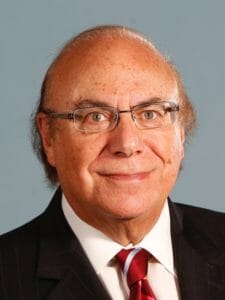

As the now-retired CEO of the Pennsylvania Health Care Association, I’ve sadly watched too many residents and staff die unnecessarily of COVID-19.
Unfortunately, we are already in the fourth wave, and cases are again accelerating despite the heroic actions of front-line healthcare workers. This time nursing homes must do a better job in preventing the emergence and spread of COVID-19.
Of the approximately 15,000 nursing homes across America, a significant number of both non-profit and for-profit homes are part of a multi-facility group. Generally, each group has a corporate office with a quality improvement team led by physicians and nurses that assumes a centralized leadership role in guiding continuous quality improvement in the individual nursing centers.
In addition to providing the individual centers with consistent policies and procedures, these corporate offices also offer financial, accounting, and budgeting guidance, contracting and legal advice, and personnel and human resources support — or at least they should.
Unfortunately, many individual nursing homes do not have the resources to fight COVID-19 that a multi-facility group can muster and thus can be more susceptible to the rapid spread of this disease unless they too implement mitigation strategies. Sure the CDC, individual state health departments, and trade associations have provided significant guidance, but those guidances were often late, confusing and inadequate.
The corporate offices of multi-facility organizations still have time to up their game and reduce COVID-related morbidity and deaths. Many did this after the first spike; all should have put these measures in place before the third wave. Today there is no excuse for the simple best practices checklist below not to have been put in place by corporate offices and individual centers.
If they have not, these corporate offices have not met best practices and a basic standard of care to ensure that the centers under their control are better equipped to ameliorate the emergence of COVID infections in their centers.
Corporate COVID-19 Best Practices:
- Every corporate office should create a Covid Management Council (CMC) led by the organization’s Chief Medical Officer and Chief Nursing Officer (or consultants that could serve in those roles).
- The CMC should have as members, in addition to the chief medical officer and chief nursing officer, an infectious disease expert, the director of human resources, the general counsel, representatives from the Operating Centers, regional nurses, etc.
- The CMC should outline how each individual center will have its own CMC in place, meeting every week during an increase in cases. The individual centers should have developed specific plans for their own CMCs, which should have been approved by the corporate CMC.
- The CMC should outline draft action plans to screen all employees and other individuals who enter the building for COVID-19 as outlined in specific guidances from the CDC and/or state health departments. Individual centers should then have developed their own individualized action plans for testing, which should be reviewed and approved by the CMC.
- The CMC should outline PPE preparation plans for the individual centers. The individual centers should also have developed specific plans and have them approved by the CMC.
- The CMC and individual centers should have general plans for the rapid isolation of infected individuals.
- The CMC and individual centers should outline plans for the testing of all residents and all staff upon the first case of COVID detected.
- The CMC should develop general contact tracing plans for staff and residents after a potential exposure to a COVID case. The individual centers should develop specific plans, which are then approved by the CMC.
- The CMC should put in place a global contract for contact tracing to be a backup to individual centers.
- The CMC and individual centers should develop general training plans and processes for staff related to COVID.
- The CMC and individual centers should develop general coordination plans related to centers’ coordination with ambulance providers, hospitals, local infectious disease experts, local health departments, and other entities.
- The CMC should create communication plans for centers to use to notify families and guardians of individuals exposed or potentially exposed to COVID. Staff should be trained on how to best communicate this information.
- The CMC and individual centers should develop environmental plans and engineering plans related to COVID, and the individual centers should develop specific plans, which should then be approved by the CMC.
- The CMC and individual centers should create contingency plans for all COVID supplies.
- The CMC should develop plans for staffing backup and contingency plans for a general rise in acuity and for caring for residents with COVID for all of its centers.
- The CMC should create plans to aid in rapid communication of the individual resident rights when a resident must be moved or any other issues related to COVID. The individual centers should also develop plans that the CMC should approve.
- The CMC should have developed specific guidance to ensure that all residents and employees are fully vaccinated according to CDC, state and local policies, and individual centers should have specific plans in place to ensure compliance. The CMC should consider recommending that all residents and staff receive a booster vaccine ahead of formal guidance.
- The CMC should have put in place a system to rapidly inform each center of any new information received from state health departments, CDC, CMS, OSHA, etc., including a mechanism for staff in the centers to ask questions. An informed front-line worker is a better front-line worker.
The failure to put in place systems like those outlined above increases the risk of serious disability and death to residents and staff from COVID-19. Nursing homes must do better.
Stuart Shapiro, a former Philadelphia Health Commissioner, served as CEO of the Pennsylvania Health Care Association from 2006 to 2015 and Interim CEO of the Health Care Association of New Jersey in 2020. He has been an advocate for quality care in nursing homes for over 15 years. He may be reached at [email protected].
The opinions expressed in McKnight’s Long-Term Care News guest submissions are the author’s and are not necessarily those of McKnight’s Long-Term Care News or its editors.





